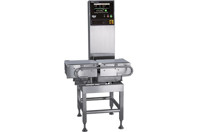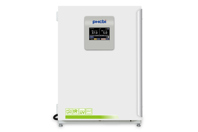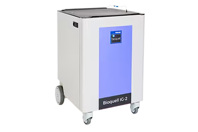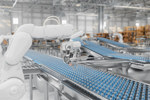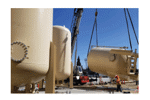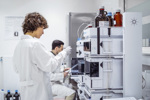Instrumentation
PRODUCTS
-
The SSV-h Checkweigher is a great cost-effective solution for industrial, pharmaceutical, and packaged food products that need to meet stringent accuracy and reliability standards. It is equipped with a force balance load cell that produces faster response and readings with maximum accuracy of +/- 0.01 g. The Smart Measurement Function uses improved signal processing, filtering, and scale resolution to reduce rejections due to double product errors. The giveaway feature calculates product excess both as total weight and percentage, allowing you to adjust filling levels and reduce costs. The SSV-h series comes with an IP30 dustproof rating that makes it ideal for non-washdown applications. Its lightweight and rigid conveyor can be easily disassembled and wiped clean without any tools.
-
Engineers use Autodesk InfoWater® Pro software to model water distribution systems in an easy-to-use GIS interface.
-
PHCbi's high heat sterilization CO2 incubator offers advanced contamination protection while streamlining laboratory operations and helping reduce environmental impact. Its stackable design and improved insulation offers added flexibility and a space-saving solution for busy labs—allowing one incubator in a stack to be decontaminated while neighboring incubators continue operating at set point. This incubator eliminates the need for consumables like HEPA filters and UV-mercury based bulbs using an eco-friendly, long-lasting UV-LED based bulb.
-
Reduce microbiological organisms on equipment, in transfer chambers, in filling line isolators and more with Ecolab’s Bioquell IG-2, a robust, fixed bio-decontamination system.
-
Deliver cost-effective, reliable public infrastructure—from permitting and construction to operation, maintenance and replacement. From the office to the field, Trimble Cityworks helps you improve service to your community while increasing safety, efficiency and performance.
WHITE PAPERS AND CASE STUDIES
-
Digital Transformation Optimizes Production, Quality, And Compliance
Discover how advanced automation solutions at Fermion's new facility were implemented to enhance production, quality, and compliance in pharmaceutical manufacturing while meeting industry standards.
-
Rapid Development Of A Liquid-Filled Capsule Formulation Of CBD
Discover how we developed and tested multiple oral formulations in just three months, identifying a top candidate that outperformed existing standards in key performance metrics.
-
Changing The Clinical Feasibility Game With AI
AI is only as good as the data it’s built upon. Our customized AI platforms are constructed on a foundation of trustworthy, carefully curated data to produce detailed, expert-driven responses.
-
How Optina Diagnostics Used EDC In Earlier Disease Detection
Understand how Optina Diagnostics streamlined operations and achieved significant milestones by leveraging Castor's tools in its effort to revolutionize the diagnostic process for Alzheimer’s.
-
Disinfection For Drinking Water Plant In Chennai, India
The Chennai Metropolitan Water Supply and Sewerage Board (CMWSSB) encountered significant challenges in treating high algae loads at its drinking water plant, which processes 1.5 million liters of water daily. The primary issue arose from the organic load in lake water, which, when treated with conventional chlorine disinfectants, resulted in harmful disinfection byproducts (DBPs).
-
AqueoUS Vets Named A Manufacturing Partner For A Southern CA Water Treatment Facility
In August 2018, Aqueous Vets was selected over existing industry incumbents to supply the Granular Activated Carbon Systems (GACS) for a Southern California Water Treatment Plant.
-
Life Sciences Corporation Implements eLogbooks Across 15 Sites
New regulations challenged how surgical kits were tracked and processed across 15 U.S. sites. Discover how one team balanced compliance and efficiency to keep life-saving procedures on schedule.
-
Optimized Stability Storage
A healthcare manufacturer facing space constraints and regulatory pressures outsourced their stability storage needs to another company, resulting in reduced costs and focus on core competencies.
-
Duchenne Muscular Dystrophy Trial In China
A global sponsor conducting a Duchenne Muscular Dystrophy trial in China required reliable patient travel solutions to support children and families.
-
Electronic Batch Reporting
Learn how a CDMO automatically created a comprehensive batch report model to drive their reporting and speed root cause identification of quality failures with an Industrial DataOps software solution.
-
Nanosuspension Formulation To Maximize Potency For Preclinical Studies
By having a tailored proactive drug development approach, companies can accelerate their API's journey through preclinical development, ensuring the creation of a stable, high-potency formulation.
-
Merck Process Transfer And Scale-Up Of Batch Protein A
Explore cost-saving innovations in purification using a system that achieves consistent product quality and yield while significantly reducing resin use and enhancing large-scale efficiency.
NEWS
-
From Everyday To Extreme, Toolant Launches Brand New Line Of Hand Tools8/15/2025
Today, toolant, a tool and accessories brand built around real-world needs, announced the launch of its brand new hand tools collection designed for automotive enthusiasts and professional car detailers alike.
-
QuasarMD Unveils Advanced Full-Body Light Therapy Mat To Support Aging Wellness7/29/2025
QuasarMD LLC, a leader in light-based wellness technologies, announces the launch of its Full-Body Light Therapy Mat, a clinically validated, non-invasive solution designed to address the evolving wellness needs of aging adults.
-
Motivosity Launches Lifestyle Spending Accounts To Help Companies Offer Flexible, Hassle-Free Employee Perks5/27/2025
Motivosity, the leading people-first employee recognition and rewards platform built for today’s workforce, is proud to announce the launch of its new Lifestyle Spending Accounts (LSAs) program.
-
Canada Accelerates Transition To Zero-Emissions Vehicles8/13/2025
Canada is leading the way on the infrastructure, innovation and partnerships required to transition to electric transportation.
-
Baden-Württemberg's Largest Solar Park Now In Operation5/28/2025
EnBW has commissioned its solar park in Langenenslingen-Wilflingen (district of Biberach in the southwest of Germany).
ABOUT
Instrumentation
The science of measuring and controlling variables is termed instrumentation. As the name suggests, the process involves using a wide variety of instruments. These are classified as any device that can measure amounts that are physically quantifiable. These instruments do not have to be extremely complex in design. For example, the ruler is an instrument to measure distance, and a simple thermometer measures temperature.
Instruments specific to petrochemical processing include platinum Resistance Temperature Detectors (RTD’s), P/I Converters, many types of level meters, chromatographs, and continuous gas analyzers. These instruments are essential to the day to day instrumentation at petrochemical plants, as it is impossible to gauge to the necessary extent by estimation alone. Human error is inevitable, but an instrument can easily be calibrated or replaced.
Now that you understand the definition of and tools used in instrumentation, you should also understand the necessity of it. Temperature and pressure meters serve to ensure that the environment stays safe for both the chemicals being processed and the employees of the plant. Heat is a very well-documented activator in chemical reactions. If the temperature rises to unusual levels, this could spark an undesired chemical reaction that could prove catastrophic. The flow meter must measure how much oil is leaving the refinery, as it is a very volatile substance. Analytical instruments, such as the chromatograph, analyze the chemical make-up of the refined oil. This allows for the opportunity to make sure that the chemical make-up is correct, giving evidence that the process was correctly completed at all stages of refinement.

